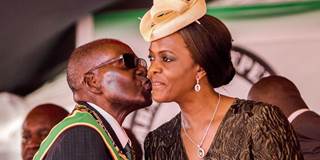In Zimbabwe, as in all coups, much behind-the-scenes plotting continues to take place in the aftermath of the military's overthrow of President Robert Mugabe. But who the eventual winners and losers are may depend, among other things, on the gender of the plotters.
LONDON – Last week, Zimbabwe’s generals took President Robert Mugabe into custody in an effective coup (though they insist on not calling it that). Days later, the country’s ruling party, the Zimbabwe African National Union – Patriotic Front (ZANU-PF), moved to expel the 93-year-old president from its ranks. But it may not have been Mugabe himself, the quintessential “big man” leader, who catalyzed this revolt, despite the ruthlessness that has characterized his nearly four-decade rule. Quite the contrary, it may have been Mugabe’s possible successor – his wife, Grace.
In the last couple of years, the 52-year-old Grace Mugabe has become increasingly active politically, even declaring her hope to succeed her husband. Just a week before the coup, Mugabe sacked his deputy, Emmerson Mnangagwa, to promote Grace to that position.
According to new research by Theresa Schroeder of Radford University and Jonathan Powell of the University of Central Florida, female heads of state may be more likely to provoke military coups in countries where armies are powerful enough to stage them. The paper cites several examples of attempted coups against woman leaders.

LONDON – Last week, Zimbabwe’s generals took President Robert Mugabe into custody in an effective coup (though they insist on not calling it that). Days later, the country’s ruling party, the Zimbabwe African National Union – Patriotic Front (ZANU-PF), moved to expel the 93-year-old president from its ranks. But it may not have been Mugabe himself, the quintessential “big man” leader, who catalyzed this revolt, despite the ruthlessness that has characterized his nearly four-decade rule. Quite the contrary, it may have been Mugabe’s possible successor – his wife, Grace.
In the last couple of years, the 52-year-old Grace Mugabe has become increasingly active politically, even declaring her hope to succeed her husband. Just a week before the coup, Mugabe sacked his deputy, Emmerson Mnangagwa, to promote Grace to that position.
According to new research by Theresa Schroeder of Radford University and Jonathan Powell of the University of Central Florida, female heads of state may be more likely to provoke military coups in countries where armies are powerful enough to stage them. The paper cites several examples of attempted coups against woman leaders.